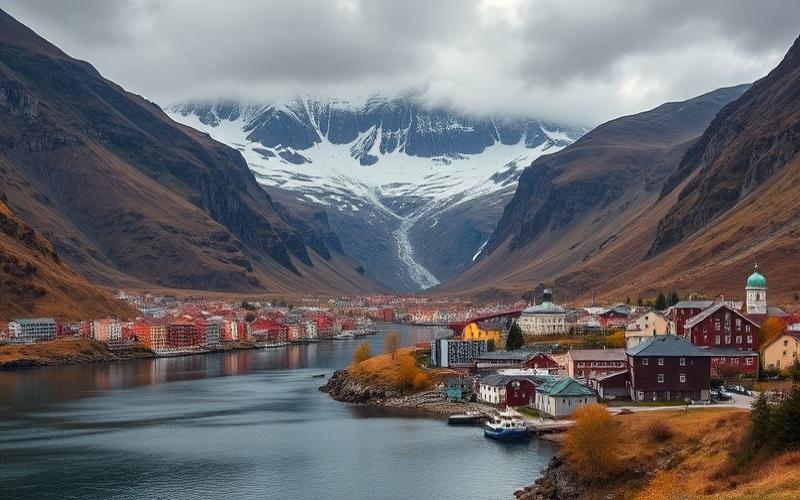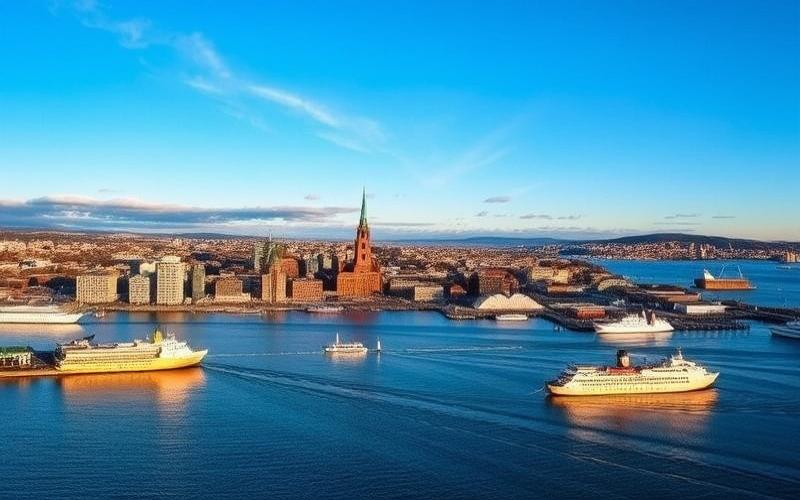
 Published on and written by Cyril Jarnias
Published on and written by Cyril Jarnias
The Norwegian real estate market presents a contrasting picture, blending economic stability with unique challenges. Let’s dive into the current trends shaping this sector in the land of fjords, where tradition and modernity coexist harmoniously.
Market Gems: Booming Sectors
Norway is currently experiencing marked enthusiasm for certain segments of its real estate market. Savvy investors and potential buyers should pay particular attention to the following sectors:
Thriving Urban Residential Market
Major Norwegian cities, particularly Oslo, Bergen, and Trondheim, continue to attract numerous residents. Demand for modern, well-located apartments remains strong, especially among young professionals and families. Central neighborhoods with good public transportation access are particularly sought after.
Green Real Estate Gaining Ground
Norway, a country renowned for its environmental awareness, is seeing growing interest in eco-friendly properties. Sustainable certified constructions incorporating energy-saving technologies and using environmentally friendly materials are attracting more and more climate-conscious buyers.
Expanding Vacation Home Market
Norway’s magnificent landscapes continue to attract nature enthusiasts. Mountain cabins (hytter) and fjord-side vacation homes are growing in popularity among both Norwegians and foreign investors seeking a foothold in this idyllic setting.
Evolving Commercial Real Estate
Although the office sector has experienced some turbulence following the widespread adoption of remote work, there’s growing demand for flexible, modern workspaces. Adaptable office buildings in well-connected areas remain attractive to businesses.
Good to Know:
The Norwegian real estate market is characterized by strong demand in urban and tourist areas, with growing interest in sustainable properties and vacation homes.
Price Trends: Evolution of the Norwegian Real Estate Market
The evolution of real estate prices in Norway reflects both the strength of the country’s economy and the challenges it faces. Here’s an overview of current trends:
Moderate but Steady Growth
Unlike some European markets that have experienced significant fluctuations, the Norwegian real estate market shows relatively stable growth. According to the latest data from Statistics Norway, housing prices have increased by an average of 3.5% over the past year, with variations by region.
Marked Regional Disparities
Oslo, the capital, continues to lead the way with some of the highest prices in the country. Coastal cities like Bergen and Stavanger also experience sustained appreciation. In contrast, rural areas and some northern regions show more modest growth, offering interesting opportunities for investors seeking potentially higher returns.
Impact of Interest Rates
The monetary policy of Norway’s Central Bank directly influences the real estate market. Recent interest rate hikes have somewhat slowed price growth, particularly in the higher market segments. However, demand remains robust, supported by a strong economy and high wages.
The Role of Oil in the Economy
The oil industry, a pillar of Norway’s economy, continues to influence the real estate market, particularly in western coastal regions. Fluctuations in oil prices can impact local demand and real estate prices in these areas.
Good to Know:
Despite moderate price growth, the Norwegian real estate market remains solid, with regional variations offering diverse opportunities for investors.
Smart Investing: Promising Segments of the Norwegian Market
For investors looking to position themselves in the Norwegian real estate market, certain property types stand out for their attractive potential:
Urban Apartments: A Bet on the Future
In major cities like Oslo, Bergen, or Trondheim, small and medium-sized apartments remain a safe bet. Rental demand is strong, driven by a young and mobile population. Studios and two-bedroom apartments, ideally located near public transportation and activity zones, typically offer good rental yields.
Student Housing: A Growing Sector
With the increasing number of students, particularly international ones, in Norwegian university cities, investing in student housing can be wise. These properties often offer stable returns and consistent demand.
Eco-Friendly Properties: Betting on Sustainable Future
Ecologically certified buildings or properties incorporating green technologies are gaining attractiveness. Not only are these investments aligned with Norway’s environmental values, but they may also benefit from tax incentives and better long-term valuation.
Tourism Residences: Capitalizing on Natural Appeal
Investing in mountain cabins or fjord-side vacation homes can offer dual benefits: personal use and seasonal rental potential. With tourism in Norway constantly growing, these properties can generate interesting income, particularly in popular regions like the Lofoten Islands or around Bergen.
Flexible Commercial Real Estate: Adapting to New Trends
Despite changes in work habits, modern, adaptable office spaces remain in demand. Buildings offering coworking spaces or flexible offices in strategic locations can constitute promising investments, particularly in business centers of Oslo or Stavanger.
Good to Know:
The most promising investments in Norway often combine strategic location, sustainable approach, and usage flexibility, thus responding to current market trends.
Conclusion: A Stable Market Offering Targeted Opportunities
The Norwegian real estate market stands out for its stability and long-term growth potential. Although high prices in some regions may constitute an entry barrier, savvy investors will find interesting opportunities by targeting growing segments and adopting a long-term approach.
Norway, with its robust economy, exceptional quality of life, and commitment to sustainable development, offers a favorable environment for real estate investment. Whether for a primary residence, rental investment, or vacation property, the Norwegian market holds numerous possibilities for those who can identify and seize them.
Disclaimer: The information provided on this website is for informational purposes only and does not constitute financial, legal, or professional advice. We encourage you to consult qualified experts before making any investment, real estate, or expatriation decisions. Although we strive to maintain up-to-date and accurate information, we do not guarantee the completeness, accuracy, or timeliness of the proposed content. As investment and expatriation involve risks, we disclaim any liability for potential losses or damages arising from the use of this site. Your use of this site confirms your acceptance of these terms and your understanding of the associated risks.















